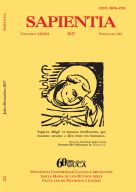The distinction between philosophy and theology ordered to the plenitude of christian wisdom
Keywords:
Philosophy, Theology, Wisdom’s Gift, Contemplation, Santiago RamírezAbstract
Following Aristotle, the Aquinas affirms that the contemplation of the divine realities constitutes the ultimate end of man (In Boet., Pr.1) Now and during this life, this act must correspond analogically with the triple division of wisdom, that is, philosophical, theological or infused. Hence, it is important to underline the real distinction that governs each wisdom —particularly, philosophical and theological— to avoid the danger of confusing them. We will review the opinion of some philosophers (Blondel and Maritain) and theologians (Günther and Frohschammer) who infringed this distinction and we will counteract these errors according to the synthesis of the great Thomistic commentator Santiago Ramírez: philosophy is not subaltern, but subordinated indirectly to theology. Finally, we will give special consideration to the psychological and ontological nature of infused contemplation, wisdom superior to the previous two, as it closely participates in the beatific vision of the saints in heaven and depends on the special motion of the Holy Spirit.Downloads
Download data is not yet available.
Downloads
Published
05/07/2019
How to Cite
Larraguibel Diez, L. E. (2019). The distinction between philosophy and theology ordered to the plenitude of christian wisdom. Sapientia, 73(242), 87–106. Retrieved from https://e-revistas.uca.edu.ar/index.php/SAP/article/view/1885
Issue
Section
Articles
License





 Sapientia
Sapientia